Dr V Sangeetha and Dr Veda Krishnan who participated and contributed to the training programme on ‘Socio-Economic Impact Assessment of Research & Development Outcomes’ for Women Scientists/Technologists organized by the Council of Scientific & Industrial Research-Human Resource Development Centre, Ghaziabad, reflect on the training programme. Here, they share the insights they gained from the various sessions.
CONTEXT
The CSIR-HRDC Training Programme on ‘Socio-Economic Impact Assessment of Research & Development Outcomes’ for Women Scientists/Technologists was held at CSIR-HRDC, Ghaziabad, from November 18 to 22, 2019. The organizers at the Council of Scientific & Industrial Research-Human Resource Development Centre (HRDC) were Dr Alok Goel and Dr Nadir Sheikh. About 22 women scientists from across the country working in a spectrum of research areas attended the programme. Participants were professors and research scientists at various premier institutes, such as Council of Scientific & Industrial Research (CSIR), Indian Council of Agricultural Research (ICAR), Indian Council of Medical Research (ICMR), Indian Institute of Technology (IITs), National Institute of Technology (NITs), Zoological Survey of India (ZSI), Department of Science & Technology (DST), UP Council of Sugarcane Research, International Advanced Research Centre for Powder Metallurgy & New Materials, Meteorological Department, Ministry of Earth Sciences, and Sardar Vallabhbhai National Institute of Technology (SVNIT).
INAUGURAL SESSION
Dr RK Sinha, Head, CSIR-HRDC, welcomed the chief guest Dr Ranjana Aggarwal, Director, CSIR-National Institute of Science, Technology and Development Studies (NISTADS). In her address, Dr Ranjana highlighted the importance of socio-economic impact assessment.
TECHNICAL SESSIONS
The technical sessions across five days, were designed mainly on S&T Innovation/Outcomes, its impact assessment, and various case studies to validate it.
Day 1
CSIR innovations were discussed as case studies by Dr NV Satyanarayana, Chief Scientist & Business Development Group Head, CSIR-IICT. He emphasized the need to work outside silos and the process to be followed from idea to technology transfer.
Day 2
Sessions were held on defining socio-economic features and identifying data requirements by Dr RN Padaria, Professor, ICAR-Indian Agricultural Research Institute (IARI), where he imparted his understanding on KASA (Knowledge, Attitude, Skill & Aspirations). He also mentioned the need to have stakeholder seminars, exposure visits, and feasibility analysis prior to programme initiation. Inventions and patents are a major part of technology transfer, and Prof. Sudhir K Jain, Adjunct Faculty & Former Professor & Head, Department of Management Studies, IIT Delhi, imparted his knowledge on this subject. He aptly highlighted the need for utility patents in the Indian scenario. The third speaker of the day, Dr K Vijaya Lakshmi, Vice President of Development Alternative, specified her socio-economic impact assessment of S&T deployment apropos water management, renewable energy, and building materials. A range of income generating opportunities for the poor was discussed in the session, one such being TARA (Technology and Action for Rural Advancement), the incubator for microenterprise-based de-centralized models, which aims at providing home building services, pure water, light, and clean cooking solutions.. The day ended with the technology transfer success stories from CSIR that Dr. Viswajanani Sattigeri, Head, CSIR-TKDL went into; she also highlighted the rigor and meticulous process in place for the knowledge acquiring process at Traditional Knowledge Digital Library (TKDL).
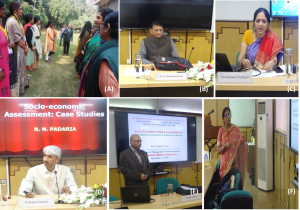
Glimpses of Technical sessions. (A) Team building session; (B) Case studies being discussed by Dr NV Satyanarayana; (C) Technology transfer success stories from CSIR by Dr Viswajanani Sattigeri, Head, CSIR-TKDL; (D) Dr RN Padaria examines socio-economic features and identifying data requirements; (E) Inventions and patents by Prof. Sudhir K Jain; and (F) Dr K Vijaya Lakshmi talks on Development Alternative-specified technologies.
Day 3
This day was planned for a field visit to the CSIR headquarters as well as other organizations. Dr Sanjay Mishra, DST, was the first speaker who enlightened us on various DST programmes, such as KIRAN, woman centric programmes, mobility schemes, Vigyan Jyoti, TARE, etc. The next session was conducted by Dr Unnat Pandit, of the Atal Innovation Mission (AIM), NITI Aayog. He made us aware of NITI Aayog activities – ATAL tinkering labs in schools, ATAL incubators, ATAL community innovation centers, and also about ATAL India’s challenges. His tri-leg matrix of technology readiness level (TRL), commercial readiness level (CRL), and societal impact level (SIL) fully conveyed the idea behind the ATAL mission. In this way, integrating social science with society or extension labs can be done by which school children can get exposure on social science/extension activities for the welfare of people, and society as a whole in the long run.
This session was followed by a team building activity session conducted by Mr YP Sharma, a Commander in the Indian Navy. He spoke of the basic difference between ‘group’ and ‘team’, and on team building skills. Participants also got an opportunity to interact with the Head of CSIR-HRDG, Dr A Chakraborty, as well as with Dr Subrahmaniam.
Day 4
Day 4 sessions were dedicated to an overview on the Design and Development of Socio-economic Impact Assessment surveys. Team tasks on socio-economic impact assessment of S&T outcomes, effective assessment, and reporting methodologies were handled by Dr Manisha Singh, Project Assistant at CSIR.
Day 5
There were many sessions on Day 5. One by Prof. VK Vijay, IIT-Delhi, dealt with experience sharing on the movement towards a Progressive India, (for example, Unnat Bharat Abhiyan [UBA]).. Another topic – ‘Fostering entrepreneurship by innovative activities and by creating conductive start up ecosystem’ – was offered by Prof. Punit Kumari Dwivedi; ‘Scalable technological solutions through action research and networking; sharing impact outreach for social transformation’ was by Dr Sunil Kumar Agarwal, DST-SEED. All these are flagship programmes of the Government of India to uplift rural India. These programmes aim at engaging communities and using technologies for their upliftment, and for the overall welfare of the country.
OTHER ACTIVITIES
Exposure visit to CSIR Headquarters
A one-day visit was arranged to CSIR HQ, where all of us were apprised on preparing winning project proposals and various fellowships offered by CSIR for women scientists. It was a platform to discuss some of the problems faced by women scientists at their work places. The participants interacted with Dr Mitali Mukerjee, from CSIR-Institute of Genomics and Integrative Biology (IGIB), New Delhi, through video-conferencing.
Group Presentations
Participants were taught to prepare logical framework for any project which they would like to do in their respective institute. The whole logical framework was discussed with special focus on socio-economic impact assessment. We were divided into three teams, namely Agriculture, Health, and Basic Sciences. Within each team, all of us discussed about our projects. Team members helped each other in preparing their logical framework. Then, at the end of the day, the group leader of the team presented it to the entire group, and discussions followed.
VALEDICTORY SESSION
The five-day long programme ended with a formal valedictory session arranged by the organizers. The chief guest of the program was Dr Sunil Kumar Agarwal, In-charge, DST-SEED, who also handed out certificates to the participants.
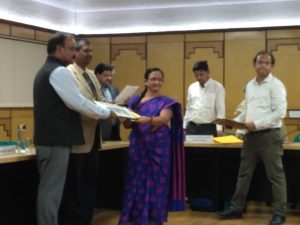
Use of social media
A WhatsApp group was created exclusively for the participants by the participants. It is a very useful tool to virtually spread and continue our networks. And as expected, the WhatsApp posts are all about collaborative research.
OUR IMPRESSIONS
The topics covered in the programme were most useful to us. We were especially pleased that the organizers were present in the sessions at all times to help the resource persons and the participants. The knowledge we acquired, especially about the opportunities available for women scientists, encourage us to strive continuously, and also motivate us to contribute further to mainstream society. Now, our thoughts are turned towards gauging the socio-economic impact assessment of every technology we come across. Even though no statistical techniques were taught, it gave overall general idea about the importance of socio-economic impact, which is currently poorly reflected in projects. Now, we also have a deeper understanding of the various socio-economic indicators which are to be used in research projects.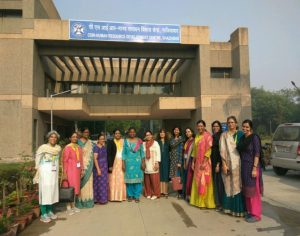
FINAL REMARKS
We would like to personally thank the Department of Science and Technology, Government of India, for creating an effective learning platform specifically for women scientists. We greatly appreciate the organizers (CSIR-HRD) for meticulously planning the program schedule that contributed significantly to our understanding of socio-economic impact assessment. Our participation in the conference gave us an opportunity to interact with researchers from various fields with diverse expertise from across the country, share ideas/experiences with them, and establish new professional connections. And, in future, this network will be properly exploited when the need for collaborative research arises. Finally, it was an amazing experience to learn about the salutary contributions of CSIR to Indian society.
 Dr V Sangeetha (Email:sangeeq@gmail.com), Nutrition Extensionist, ICAR-Indian Agricultural Research Institute, Delhi;
Dr V Sangeetha (Email:sangeeq@gmail.com), Nutrition Extensionist, ICAR-Indian Agricultural Research Institute, Delhi;
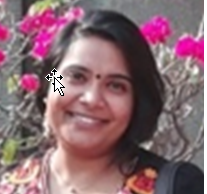
Dr Veda Krishnan (Emali: vedabiochem@gmail.com), Nutrition Biochemist, ICAR-Indian Agricultural Research Institute, Delhi.



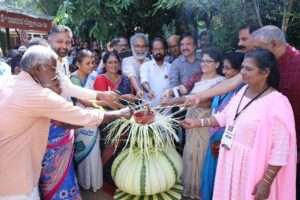

Add Comment